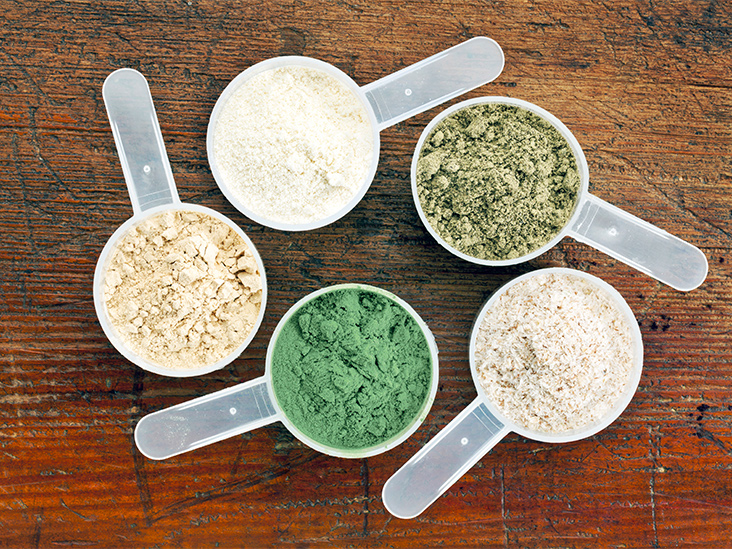
So, you’ve done your research on supplementing your diet with protein powder and have decided which type of protein powder you want to try – but you might still be wondering how, when and how much protein powder to take.
How much protein powder should you take?
The recommended daily intake of protein is around 55.5g for males and 45g for females.
For most people, about 15g to 25g of protein – whether from a powder or another protein source – consumed after a workout or intense exercise session is enough for optimal muscle protein synthesis (which is how the body builds up muscle mass).
It’s recommended that athletes, including bodybuilders, consume 1.2g to 2g of protein per kilogram of body weight.
You’ll need to follow your protein powder dosage instructions carefully, but as a guide, a whey protein shake contains about 20g of protein.
When should you take protein powder?
It’s recommended that you eat a meal or snack containing carbohydrates, protein, and fluids after exercise. A protein shake is an easy way to consume a large amount of protein without having to prepare a meal and can also be more appetizing than trying to eat protein-rich food just after exercising.
Can a protein shake replace a meal?
Protein shakes don’t offer the key nutrients and vitamins that you get from a balanced meal, so they shouldn’t replace food. In fact, you can get all the protein your body needs by eating a balanced diet that includes protein-rich foods. If you’re exercising intensely, you’ll also need some carbohydrates after a workout to help your body recover.
Is protein powder safe?
It’s important to purchase your protein powder from a reputable source, like a pharmacy, and follow the dosage instructions carefully. As with all medicines and supplements, if you’re unsure whether protein powder is right for you or if you experience any side effects after taking it, speak to your doctor.
Don’t be tempted to take more protein powder than you need – medical experts advise against consuming more than twice the recommended daily protein intake. Getting too much protein may increase your risk of a condition that affects the bones, causing them to become weak and fragile and more likely to break (osteoporosis), and worsen pre-existing kidney problems.
Until more research has been done, it’s not recommended that children use protein powder.
Does protein powder make you gain weight?
Believing that eating a high-protein diet will give you bigger muscles is a common misconception. Some protein supplements are high in calories, plus, it’s actually possible to eat more protein than you can use, which your body will then break down and store as fat – this can lead to weight gain.
Does protein powder expire?
Like all supplements, protein powders do come with an expiration date. Some research suggests whey protein powder lasts for 9 to 19 months when stored properly. Most protein powders have additives that mean they last for up to 2 years. While there is no high-quality research investigating the safety of using expired protein powder, it’s not recommended.
Key points
- 15g to 25g of protein consumed after intense exercise is usually enough for building muscle mass
- follow protein powder dosage instructions carefully
- protein shakes shouldn’t replace regular meals
- taking too much protein powder may cause health problems and weight gain
Author: Daniel Piggott
13 references
Carbohydrates, Proteins, and Fats – Disorders of Nutrition – MSD Manual Consumer Version [Internet]. MSD Manual Consumer Version. 2019 [cited 12 January 2021]. Available here
https://www.msdmanuals.com/en-gb/home/disorders-of-nutrition/overview-of-nutrition/carbohydrates-proteins-and-fats?query=protein
Nutrition for sport and exercise [Internet]. Bupa. n.d. [cited 12 January 2021]. Available here
https://assets.bupa.co.uk/~/media/images/healthmanagement/pdfs/sports-nutrition-plan.pdf
Boosting energy and protein in everyday foods | Coping with cancer | Cancer Research UK [Internet]. Cancerresearchuk.org. 2020 [cited 12 January 2021]. Available here
https://www.cancerresearchuk.org/about-cancer/coping/physically/diet-problems/managing/putting-on-weight/boosting-energy
High-calorie drinks | Coping with cancer | Cancer Research UK [Internet]. Cancerresearchuk.org. 2020 [cited 12 January 2021]. Available here
https://www.cancerresearchuk.org/about-cancer/coping/physically/diet-problems/managing/putting-on-weight/high-calorie-drinks
Nutrition for sport and exercise – British Nutrition Foundation – Page #1 [Internet]. Nutrition.org.uk. 2020 [cited 12 January 2021]. Available here
https://www.nutrition.org.uk/healthyliving/an-active-lifestyle/eating-for-sport-and-exercise.html?start=2
Obesity and overweight [Internet]. Who. int. 2020 [cited 12 January 2021]. Available here
https://www.who.int/news-room/fact-sheets/detail/obesity-and-overweight
Bodybuilding and sports supplements: the facts [Internet]. NHS.uk. 2018 [cited 12 January 2021]. Available here
https://www.nhs.uk/live-well/healthy-body/body-building-sports-supplements-facts/
Eating well during and after cancer | Health Information | Bupa UK [Internet]. Bupa.co.uk. 2020 [cited 12 January 2021]. Available here
https://www.bupa.co.uk/health-information/cancer/eating-well-cancer
Food for exercise | Health Information | Bupa UK [Internet]. Bupa.co.uk. 2020 [cited 12 January 2021]. Available here
https://www.bupa.co.uk/health-information/exercise-fitness/food-for-exercise
The hidden dangers of protein powders. Harvard Medical School, updated 10 April 2020 [cited 19 January 2021]. Available here
https://www.health.harvard.edu/staying-healthy/the-hidden-dangers-of-protein-powders
Adding energy and protein to a soft diet | Coping with cancer | Cancer Research UK [Internet]. Cancerresearchuk.org. 2020 [cited 12 January 2021]. Available here
https://www.cancerresearchuk.org/about-cancer/coping/physically/diet-problems/managing/putting-on-weight/adding-calories-to-soft-diet
Supplements [Internet]. Bda.uk.com. n.d. [cited 12 January 2021]. Available here
https://www.bda.uk.com/resource/supplements.html
Does Protein Powder Expire? [Internet]. Healthline. 2021 [cited 11 February 2021]. Available here
https://www.healthline.com/nutrition/does-protein-powder-expire#shelf-life
